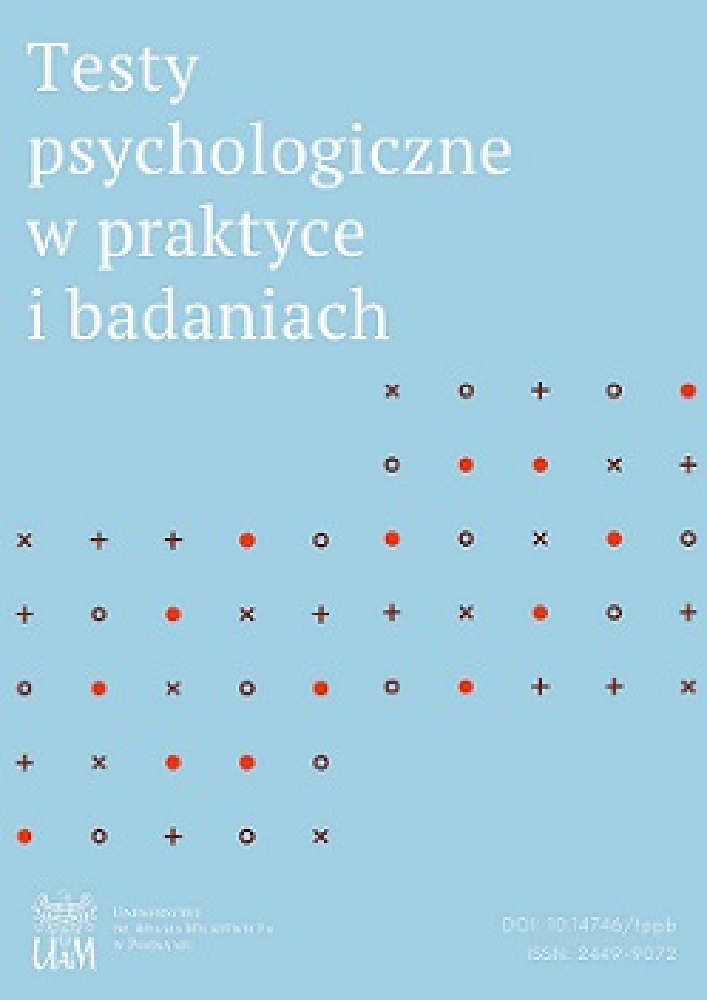Abstrakt
Sprawdzono trafność teoretyczną Kwestionariusza radzenia sobie w sytuacjach stresowych (CISS) ze szczególnym uwzględnieniem trafności skali stylu skoncentrowanego na unikaniu (SSU). 141 studentów (76 kobiet, 65 mężczyzn) w wieku 19-26 lat, wypełniło: kwestionariusz CISS, Skalę Uogólnionej Własnej Skuteczności, Pure Procrastination Scale oraz Kwestionariusz spędzania wolnego czasu. Badanie trafności metodą analiz: macierzy korelacji, czynnikowej oraz struktury wewnętrznej testu, dostarczyło argumentów świadczących na korzyść trafności teoretycznej, zarówno skali SSU jak i całego kwestionariusza. Uwzględniając uzyskane dane oraz wyniki badań zagranicznych (Endler, Parker, 1990b, 1994; Cosway, Endler, Sadler, Deary, 2000), sugeruje się rozważenie wprowadzenia w polskiej wersji kwestionariusza zróżnicowania norm stenowych dla płci.
Bibliografia
Bandura, A. (1991). Self-Regulation of Motivation Through Anticipatory and Self-Reactive Mecha-nisms.W: R. A. Dienstbier, (red.), Perspectives on motivation:Nebraska Symposium on Moti-vation.(s. 69–164). Lincoln: University of Nebraska Press.
Bandura, A. (1993). Perceived Self-Efficacy in Cognitive Development and Functioning. Educational Psychologist, 28(2), 117-148. DOI:10.1207/s15326985ep2802_3.
Bandura, A. (2001). Social Cognitive Theory: An Agentic Perspective. Annual Review of Psychology, 52, 1–26. DOI:10.1146/annurev.psych.52.1.1.
Cosway, R., Endler, N. S., Sadler, A. J., Deary, I. J. (2000). The Coping Inventory for Stressful Situa-tions: Factorial Structure and Associations With Personality Traits and Psychological Health. Journal of Applied Biobehavioral Research, 5(2), 121–143. DOI:10.1111/j.1751 9861.2000.tb00069.x.
Endler, N. S., Parker, J. D. (1990a). Coping Inventory for Stressful Situations (CISS): Manual. Toronto: Multi-Health Systems, Inc.
Endler, N. S., Parker, J. D. (1990b). Multidimensional assessment of coping: A critical evaluation. Journal of Personality and Social Psychology, 58(5), 844–854. DOI:10.1037//0022-3514.58.5.844.
Endler, N. S., Parker, J. D. (1994). Assessment of multidimensional coping: Task, emotion, and avoid-ance strategies. Psychological Assessment, 6(1), 50.
Flett, G. L., Blankstein, K. R., Martin, T. R. (1995). Procrastination, Negative Self-Evaluation, and Stress in Depression and Anxiety. W:J. R. Ferrari, J. L. Johnson, W. G. McCown (red.), Pro-crastination and Task Avoidance: Theory, Research, and Treatment. (s. 137–166). New York: Plenum Press.
Folkman, S., Lazarus, R. S. (1988).Ways of coping questionnaire: Sampler set: manual, test booklet, scoring key. PaloAlto: Consulting Psychologists Press.
Greenglass, E. (2004). Różnice wynikające z ról płciowych, wsparcie społeczne i radzenie sobie ze stresem. W: R. Cieślak, H. Sęk, (red.), Wsparcie społeczne, stres i zdrowie. (s. 146–149). Warszawa: Wydawnictwo Naukowe PWN.
Heszen, I., (2013). Psychologia stresu: Korzystne i niekorzystne skutki stresu życiowego. Warszawa: Wydawnictwo Naukowe PWN.
Juczyński, Z. (2009). Narzędzia pomiaru w promocji i psychologii zdrowia. Warszawa: Pracownia Testów Psychologicznych.
Klein, E. (1966). A comprehensive etymological dictionary of the English language: Dealing with the origin of words and their sense development thus illustrating the history of civilization and culture. Amsterdam: Elsevier.
Lay, C. (1986). At last, my research article on procrastination. Journal of Research in Personality, 20 (4), 474–495. doi:10.1016/0092-6566(86)90127-3
Oleś, P. (2003). Wprowadzenie do psychologii osobowości. Warszawa: Wydawnictwo Naukowe "Scholar".
Roth, S., Cohen, L. J. (1986).Approach, avoidance, and coping with stress. American Psychologist, 41(7), 813–819. DOI:10.1037//0003-066X.41.7.813.
Shikai N., Uji M., Chen Z., Hiramura H., Tanaka N., Shono M., Kitamura T. (2007). The Role of Coping Styles and Self-efficacy in the Development of Dysphoric Mood Among Nursing Students. Journal of Psychopathology and Behavioral Assessment, 29,241–248. DOI:10.1007/s10862-007-9043-3.
Steel, P. (2007).The Nature of Procrastination: A Meta-Analytic and Theoretical Review of Quintes-sential Self-Regulatory Failure. Psychological Bulletin, 133(1), 65–94. DOI:10.1037/0033-2909.133.1.65.
Steel, P. (2010). Arousal, avoidant and decisional procrastinators: Do they exist? Personality and In-dividual Differences, 48 (8), 926–934. DOI:10.1016/j.paid.2010.02.025.
Strelau, J., Jaworowska, A., Wrześniewski, K., Szczepaniak, P. (2005). Kwestionariusz Radzenia Sobie w Sytuacjach Stresowych CISS: Podręcznik do polskiej normalizacji. Warszawa: Pra-cownia Testów Psychologicznych Polskiego Towarzystwa Psychologicznego.
Endler, N. S., Parker, J. D. (1990b). Multidimensional assessment of coping: A critical evaluation. Journal of Personality and Social Psychology, 58(5), 844–854. DOI:10.1037//0022-3514.58.5.844.
Endler, N. S., Parker, J. D. (1994). Assessment of multidimensional coping: Task, emotion, and avoid-ance strategies. Psychological Assessment, 6(1), 50.
Flett, G. L., Blankstein, K. R., Martin, T. R. (1995). Procrastination, Negative Self-Evaluation, and Stress in Depression and Anxiety. W:J. R. Ferrari, J. L. Johnson, W. G. McCown (red.), Pro-crastination and Task Avoidance: Theory, Research, and Treatment. (s. 137–166). New York: Plenum Press.
Folkman, S., Lazarus, R. S. (1988).Ways of coping questionnaire: Sampler set: manual, test booklet, scoring key. PaloAlto: Consulting Psychologists Press.
Greenglass, E. (2004). Różnice wynikające z ról płciowych, wsparcie społeczne i radzenie sobie ze stresem. W: R. Cieślak, H. Sęk, (red.), Wsparcie społeczne, stres i zdrowie. (s. 146–149). Warszawa: Wydawnictwo Naukowe PWN.
Heszen, I., (2013). Psychologia stresu: Korzystne i niekorzystne skutki stresu życiowego. Warszawa: Wydawnictwo Naukowe PWN.
Juczyński, Z. (2009). Narzędzia pomiaru w promocji i psychologii zdrowia. Warszawa: Pracownia Testów Psychologicznych.
Klein, E. (1966). A comprehensive etymological dictionary of the English language: Dealing with the origin of words and their sense development thus illustrating the history of civilization and culture. Amsterdam: Elsevier.
Lay, C. (1986). At last, my research article on procrastination. Journal of Research in Personality, 20 (4), 474–495. doi:10.1016/0092-6566(86)90127-3
Oleś, P. (2003). Wprowadzenie do psychologii osobowości. Warszawa: Wydawnictwo Naukowe "Scholar".
Roth, S., Cohen, L. J. (1986).Approach, avoidance, and coping with stress. American Psychologist, 41(7), 813–819. DOI:10.1037//0003-066X.41.7.813.
Shikai N., Uji M., Chen Z., Hiramura H., Tanaka N., Shono M., Kitamura T. (2007). The Role of Coping Styles and Self-efficacy in the Development of Dysphoric Mood Among Nursing Students. Journal of Psychopathology and Behavioral Assessment, 29,241–248. DOI:10.1007/s10862-007-9043-3.
Steel, P. (2007).The Nature of Procrastination: A Meta-Analytic and Theoretical Review of Quintes-sential Self-Regulatory Failure. Psychological Bulletin, 133(1), 65–94. DOI:10.1037/0033-2909.133.1.65.
Steel, P. (2010). Arousal, avoidant and decisional procrastinators: Do they exist? Personality and In-dividual Differences, 48 (8), 926–934. DOI:10.1016/j.paid.2010.02.025.
Strelau, J., Jaworowska, A., Wrześniewski, K., Szczepaniak, P. (2005). Kwestionariusz Radzenia Sobie w Sytuacjach Stresowych CISS: Podręcznik do polskiej normalizacji. Warszawa: Pra-cownia Testów Psychologicznych Polskiego Towarzystwa Psychologicznego.
